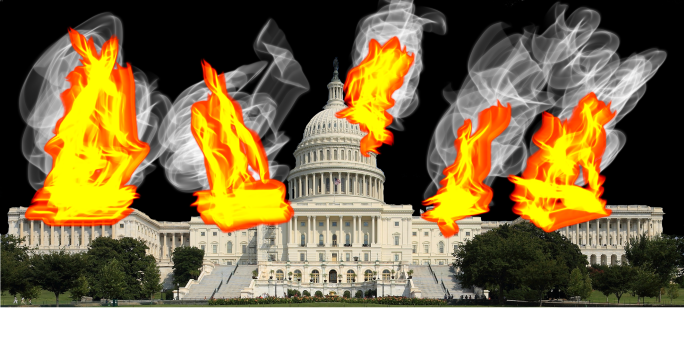Well that can’t be good.
Over the weekend, The Sunday Times revealed that the UK was at its most likely to disintegrate since…
Well, ever.
According to the ST, 50% of Scottish and 51% of Northern Irish voters want a border poll in the next five years. Not only that, even Wales, lovely, trustworthy Wales, stands at 31% wanting a vote.
It gets worse. 42% of Northern Irish people want a unified Ireland, up to 47% among the under-45s, 23% of Welsh voters want independence, up from the percentages in the teens just five years ago, and, best of all, there is a majority in Scotland for independence. The split?
52 : 48.
And we all know how well that goes.
YOU CAN TAKE OUR LIVES…
For most of this article, I’ll be focussing on the issue of Scottish independence. Not just because it’s the most likely and the most immediate concern, but also because I am a quarter Scottish. I have written about Scottish independence before, and you can find the article here.
I was a bit younger, quite a bit angrier, and I swore more.
The issue of Scottish independence has reared its head before, most memorably in the 2014 independence referendum, in which Scotland chose to remain by 55% to 45%. This margin of victory is particularly irritating. It’s not quite small enough for the Scottish National Party (SNP) to argue that there’s scope for a majority due to turnout, but it’s also not quite big enough to definitively end the debate once and for all.
And now, when you add Brexit, coronavirus and, yes, Boris Johnson to the mix, the gap seems far, far smaller. Look at the polls – while famously inaccurate, they are still giving the politicians in Westminster cause to splutter out their brandies in shock.
Look, Brexit and Boris go hand-in-hand like two lemmings skipping towards the White Cliffs of Dover at top speed. Scotland voted convincingly in favour of remaining in the EU (62%) and the SNP have made rejoining it a cornerstone of their independence campaign. Now that we’ve left and Scottish fishermen are literally driving lorries of rotting fish to Westminster to show how well it’s going, there’s little surprise that this will add fuel to the independence fire.
But Boris seems to be ubiquitous for all things politically shite for the Scots. Before coronavirus was nary a small, escaped germ on the back of a Chinese scientist’s lab coat (possibly, he says for legal reasons), Johnson was already loathed by Scottish people…
And then the pandemic struck. I haven’t minced my words when it comes to Johnson’s government’s handling of the coronavirus crisis, but it seems as though the Scots are even more critical than I am. Some more stats from The Sunday Times:
- 42% think their country would have handled it better were they independent (vs. 23% who disagree);
- 53% think the decisions should be made in Edinburgh;
- 22% think Johnson has done a good job at handling the pandemic;
- Whereas 61% think Nicola Sturgeon (leader of the SNP) has done a good job.
This is uncomfortable reading. The Scottish people clearly think that Johnson has been a useless bawbag when it comes to handling the crisis and blame him for the number of deaths that Scotland has suffered. 37% think that independence is likely if he remains “in charge”, compared to 29% for Rishi Sunak and 27% for Keir Starmer.
Clearly, in Barrowfield that Johnson charm goes down as well as a fart in a ceiling fan.
So what does all this mean? There are local elections in Scotland coming up and the SNP is expected to absolutely mop up. Sturgeon is going to claim that this gives her a new mandate for an independence referendum, which Johnson has explicitly said he will not countenance.
Sturgeon could order a non legally-recognised referendum like in Catalonia in Spain, but also knows that this risks sowing more division than unity in her vision. Additionally, the whispers in Westminster are that the government is planning to have a review into how governance is carried out in Britain, which could feasibly lead to greater devolved powers going to Holyrood or, at least, more money. Add to this the ongoing row within the SNP about whether or not its previous leader, Alex Salmond, sexually molested someone and Sturgeon hushed it up, and nothing is certain.
But it seems as though the case for independence is growing. Not just in Scotland, but in the other devolved states, too. The end of the United Kingdom as we know it could well happen within the next couple of decades. This makes me extremely sad.
But do you know what? I’m not entirely sure I blame them.
RUE BRITANNIA
As I mentioned, I’m a quarter Scottish. This, to my mind, makes me British. Whenever I fill out surveys or forms, I always put British over English. To my mind, I identify as being a citizen of the United Kingdom far more than I do being a citizen of England.
And don’t get me wrong, England is lovely. Beautiful countryside; punching above our weight financially, culturally and politically for our size; iconic locations and a profound aura of history behind us.
But I have to say, I’m proud of being British. I’m not proud of being English.
Britain’s makeup has always favoured England, as it should, to an extent – larger population, larger economy etc etc. But this has taken us to a deeply alarming sense of cultural superiority. Our London-centric democracy has given rise to resentment from the devolved nations, and successive English prime ministers have failed to address it.
This superiority has filtered down to English people, too. Just look at how our national football fans act when following the team abroad. Look at Brexit. Look at increasingly right-wing views on immigration and multiculturalism. Our exceptionalism has become aggressive and overt, based on some antiquated notion of empire and cultural hegemony.
And I despise it.
I know that it’s not all English people, and I know that everyone is entitled to their opinions, but it’s just not me. I believe in a world where borders are there for identification’s sake only, and where we welcome diversity of culture and thought.
But Little England is doing its best to throttle it. Johnson’s 80-seat majority on a platform of small-mindedness and closed borders couldn’t be clearer.
And the Scottish people, and, increasingly, Northern Irish and Welsh people, too, envisage a different future. When I wrote my last article, I called in favour of the union, begging Scottish people to remain a part of the Great British project.
Now, I’m not so sure. The louder the voices in Westminster declare we are “world-beating,” the further I think it to be from the truth. If we can listen to the people from our devolved nations, if the English can stop thinking ourselves so superior, and if we can rally the union to provide a united platform to grow after the pandemic, then our place at the top table of world politics might still be intact.
Otherwise, I’m just not sure we’ll be relevant in twenty years from now. Rich, maybe. But relevant?
We’ll have to wait and see.


















